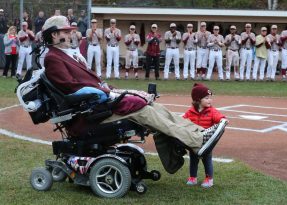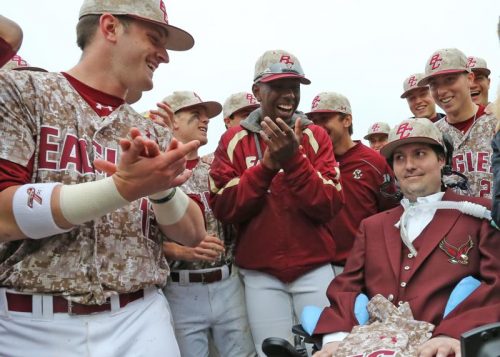WASHINGTON (CNS) — At a packed funeral Mass in Boston Dec. 13 for Pete Frates, whose battle with ALS helped propel the viral ice bucket challenge, the homilist urged the congregation to face adversity as Frates did: “Be patient hopeful and strong. Live life honorably and be aglow with goodness.”
Father Tony Penna, associate vice president and director of campus ministry at Boston College, also spoke directly to Frates’ wife, Julie, saying that those who filled the church and the overflow crowd in the basement at St. Ignatius Church in Chestnut Hill, were a testament to those whose lives were touched and made better by Pete’s presence.
“That is the unspoken homily; your husband’s life mattered to people,” he said.
Frates, a former Boston College baseball captain, was diagnosed with amyotrophic lateral sclerosis, also known as Lou Gehrig’s disease, in 2012. Although he died of complications from the neurodegenerative disease Dec. 9 at 34, he is best known for his courageous fight against it and for essentially being the face behind the viral challenge that helped raise more than $220 million for ALS research.

Frates didn’t come up with the fundraiser where people posted videos of themselves dumping buckets of ice-cold water on their heads and challenging four friends to do the same, make a donation, or both, to fight ALS. He was behind this trend early on though, dousing himself at Fenway Park in Boston, and getting others involved, including New England Patriots stars Tom Brady and Julian Edelman and Red Sox owner John Henry. From there, the challenge took off and Frates was right there with it.
During the height of this challenge, it raised questions from some Catholics who wanted to participate but were concerned by the ALS Association’s support for research that used embryonic stem cells, which the Catholic Church opposes. Many Catholic participants in the challenge chose to send their donations instead to the John Paul II Medical Research Institute, based in Iowa City, Iowa, which used adult stem cells with therapeutic potential for ALS research.
In an interview with Boston College’s student newspaper, The Heights, about a year after his diagnosis, Frates said his role as advocate for researching ways to cure the disease “gives me another reason to get out of bed every day. Being part of something bigger than yourself is one of the best things you can do.”
ALS patients are typically expected to live for two to five years from the time of diagnosis. As the disease progressed for Frates, he became paralyzed and had to use a wheelchair, lost the ability to talk and had to be fed through a tube.
Frates, who played professional baseball in Europe after graduating from college in 2007, met his wife while they were both students and the two married in 2013. Their daughter, Lucy, was born one year later.
In an interview for the news website boston.com in 2012, Julie Frates said they had learned early on as a couple how to fulfill the vow to love each other in sickness and in health. “We’ve got that one nailed,” she added.
“Pete Frates possessed the characteristics we hold dear as a university — courage, integrity, selflessness, and a commitment to helping others,” said Boston College spokesman Jack Dunn. “He accepted his illness and devoted the remaining years of his life to raising awareness of ALS and helping to raise money for a cure. He is a role model for all BC students and a beloved figure on our campus.”
A statement from the Frates family — which includes his parents, Nancy and John, who also are Boston College graduates, and his two siblings, Andrew Frates and Jennifer Mayo — described Pete as an inspiration to people around the world who drew strength from his courage and resiliency.
They described Pete as a “natural born leader and the ultimate teammate” and said young athletes looked up to him for his “bravery and unwavering positive spirit in the face of adversity.”

“He was a noble fighter who inspired us all to use our talents and strengths in the service of others,” the family said, pointing out that Pete never complained about his illness but instead “saw it as an opportunity to give hope to other patients and their families. In his lifetime, he was determined to change the trajectory of a disease that had no treatment or cure.”
This message was echoed at the funeral service where Pete’s father, John, reminded the congregation in the eulogy for his son that “there’s no crying in baseball,” quoting the Tom Hanks line from the 1992 movie “A League of Their Own.”
On a similar note, he said his son had said: “There’s no wallowing in ALS,” the day he was told of his diagnosis.
“So, when we walk out of this beautiful magnificent church after this ceremony is over, we’re done with grieving. We’re done,” his father said. “All we’re doing is celebrating Pete Frates for the magnificent human he was.”
In memory of Frates, the family has asked people to consider making a donation to the Pete Frates Family Foundation, https://petefrates.com, which help ALS patients and their families with the cost of home health care. In 2017, the Frates family publicly revealed that their medical bills each month ranged from $70,000 to $95,000.






















